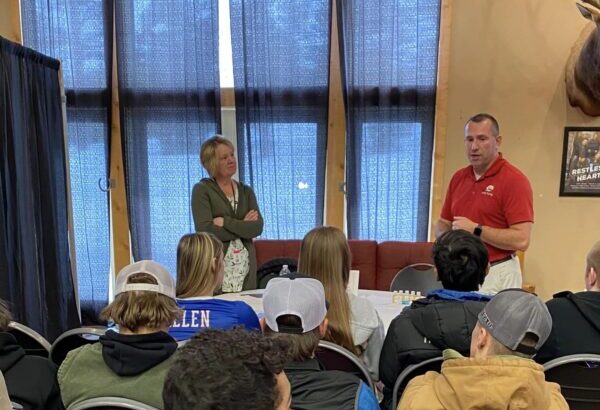The Rural County Career Fair featured many local businesses which thrive in rural communities. Representatives from these companies came and spoke to juniors and seniors in a Q&A session to share some of their experience.
Here is what they talked about:
Health
There were two kinds of health professionals at the fair: a nurse, and an athletic trainer.
Both gave personal experiences on their path toward healthcare. Prospective nurses often begin entry-level jobs in housekeeping or cooking at the hospital before they even graduate from high school. To be nurses and doctors, though, they must go to medical school. Healthcare jobs have a lot of security and are often available anywhere in the world.
Athletic trainers usually have a four-year degree in biology or exercise science, and a master’s degree in athletic training. Athletic trainers are different from physical therapists because instead of treating injuries, they try to prevent them. Most work one-on-one with active individuals on a daily basis. Athletic training is great for people who like sports and medicine but don’t want to go to medical school, though they don’t have quite as much freedom to live anywhere as nurses do.
Law Enforcement
Law enforcement is another job that is needed pretty much anywhere. Highway patrolmen said they appreciated the leeway to live where you want and work the kinds of highways you want. Highway patrol is also required to pay you a wage while you are in military training.
In Rural Utah highway patrolmen usually make between $25-50 per hour, but if you decided to work in a bigger, busier city, it is likely the pay would be more.
Professionals
Three different kinds of workers talked about their jobs and career paths in the professionals Q&A group. These were an educator, an accountant and an attorney.
A career in education will require a degree in some type of teaching. It’s important that teachers learn not just the content of what they will be teaching, but also how to teach it. Pedagogy, not just content.
Accountants, like teachers, will usually have a bachelor’s degree, in this case in accounting. After this they have a lot of options as to the type of accounting they will go into, whether that is doing taxes, working with the FBI, or investing.
Attorneys also have a couple options. They can choose between criminal, civil and transactional law. Each type has its pros and cons, varying according to pay, job security, and workload. It’s good to intern at a law firm before you decide which subset to go into. Then it’s off to law school!
Remote Work
Remote work is a huge, growing option for work in rural communities. The Rural Online Initiative’s goal is to increase remote work in Rural Utah “so that you are able to stay where you want.”
Pretty much anything that involves computers can be done remotely, from tech jobs, to accounting, to teaching English, to legal work. Rural Online Initiative will teach the skills needed to be successful at remote work, such as setting up a home office and communicating across long distances.
Natural Resources
The last group was probably the most obvious, at least in Garfield County: national park and forest service jobs. But there was still a lot to learn about exactly how many jobs are available working for the government.
The national park is so big that it offers almost any job out there. “You get to work in wildlife, you get to work in geology, you get to work in paleontology,” the group mentioned, in addition to HR, trail maintenance, touring, office jobs, etc.
The benefits are great too. You can accrue sick leave and annual leave much easier than at other jobs. With the national parks you never have to be stuck in one place. You can move around to different departments without much difficulty, and you can travel across the country if you ever get sick of one national park — the presenter, Lana, had worked at five!
Like healthcare jobs, a lot of federal careers don’t require a college degree. And there are programs to help you get started. The YCC, headed by Daniel Medina, is a group of 15–18-year-old youth workers who work on a number of projects in trails and maintenance. The IIC is another program for young people set up through SUU internships.
Conclusion
Rural communities have many job opportunities available. Often the biggest problem is just getting the word out. The Rural County Career Fair is a great way to get information to students about how they can be successful right where they are.
– The Byway
Feature image caption: Healthcare representatives from Garfield Memorial Hospital and SUU teach students about getting into a career in healthcare. Courtesy BVHS.

